Immigration Law: Case Study on Inadmissibility - UBC Certificate
VerifiedAdded on 2023/06/15
|8
|1451
|407
Case Study
AI Summary
This case study solution analyzes various aspects of Canadian immigration law, particularly focusing on inadmissibility grounds under the Immigration and Refugee Protection Act (IRPA). It addresses scenarios involving convictions for driving without a license and impaired driving, examining how these offenses impact admissibility to Canada. The solution also delves into security concerns related to membership in radical movements and the procedural fairness requirements in inadmissibility decisions. Furthermore, it discusses potential avenues for appeal and exceptions to inadmissibility, providing a comprehensive overview of the legal considerations within the context of the presented case study. Desklib offers a platform for students to access similar solved assignments and past papers.
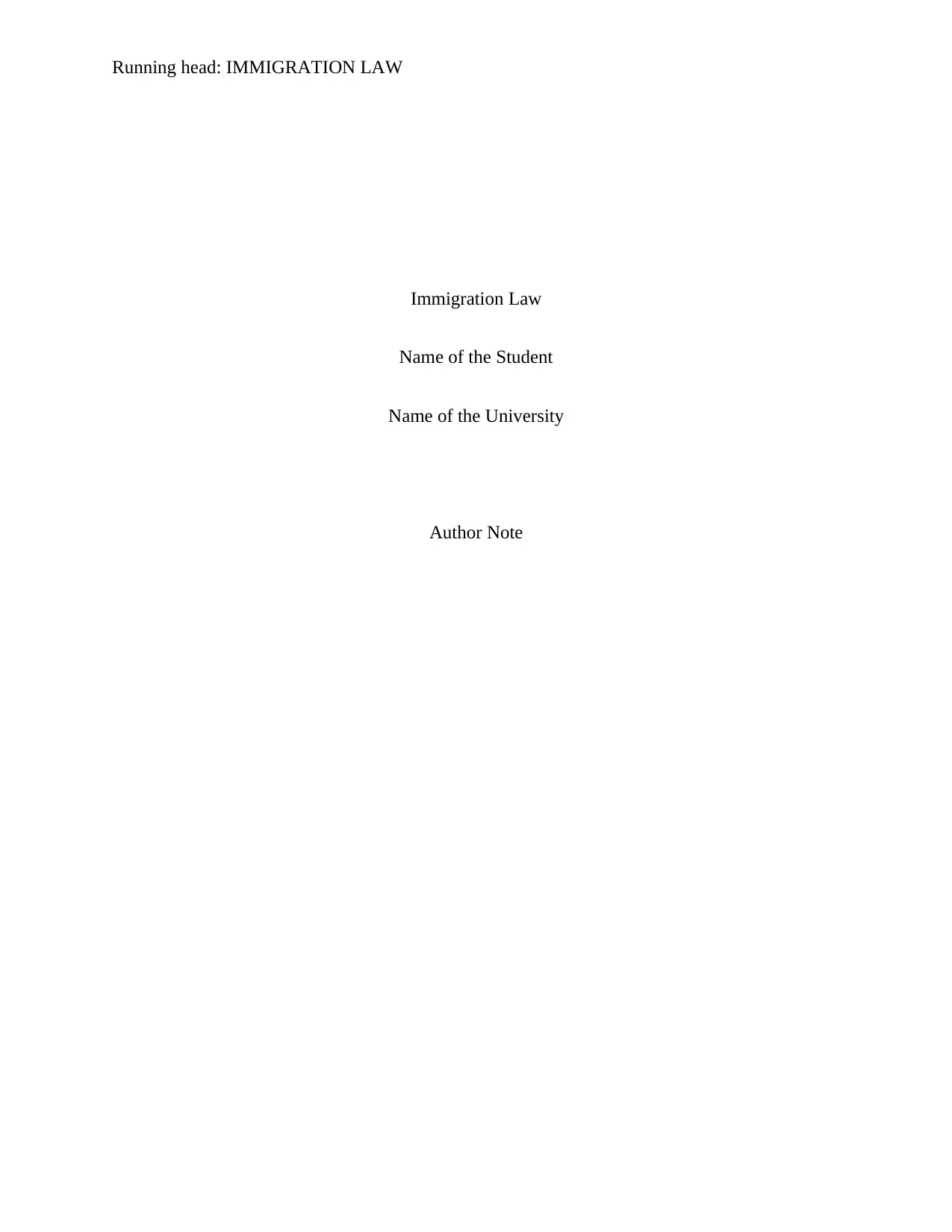
Running head: IMMIGRATION LAW
Immigration Law
Name of the Student
Name of the University
Author Note
Immigration Law
Name of the Student
Name of the University
Author Note
Paraphrase This Document
Need a fresh take? Get an instant paraphrase of this document with our AI Paraphraser
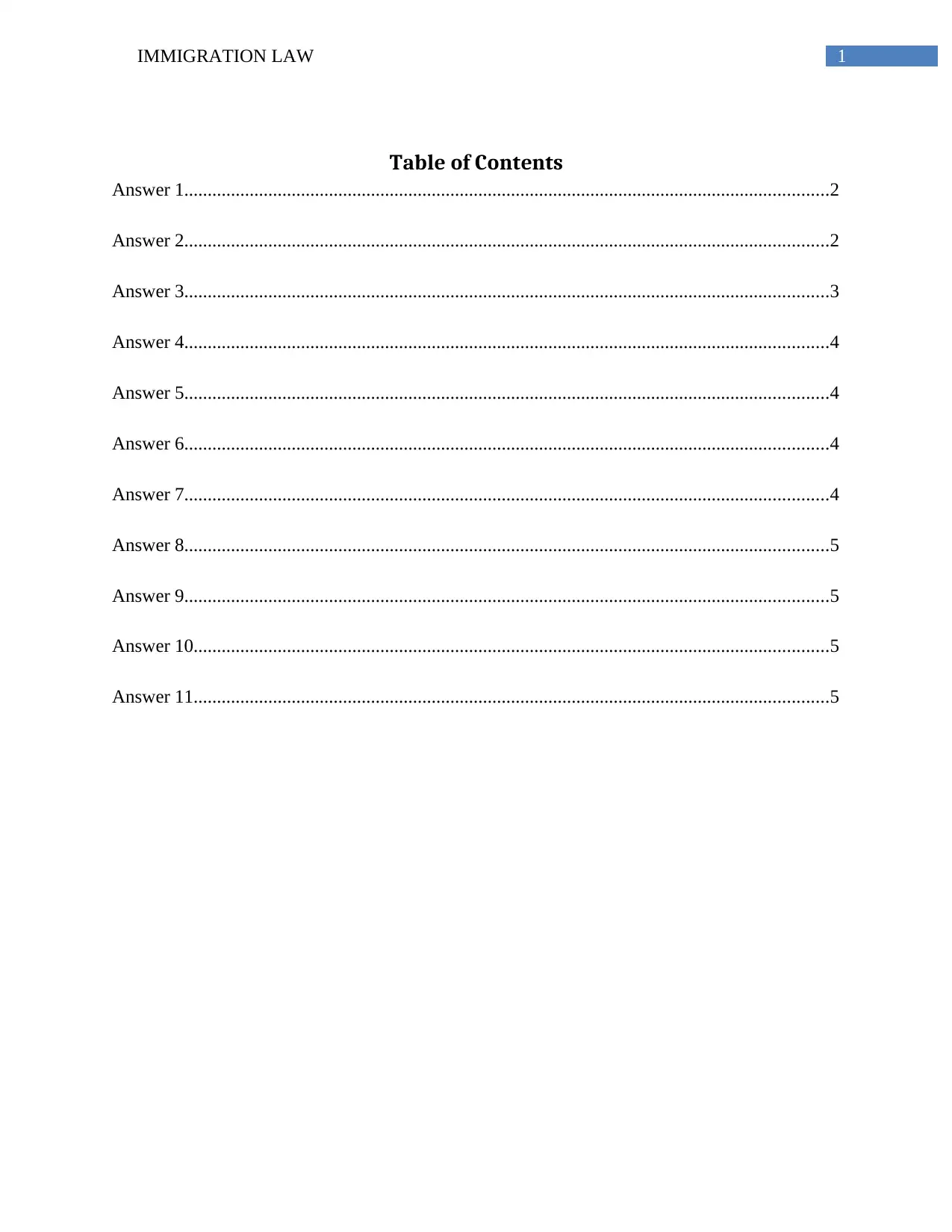
1IMMIGRATION LAW
Table of Contents
Answer 1..........................................................................................................................................2
Answer 2..........................................................................................................................................2
Answer 3..........................................................................................................................................3
Answer 4..........................................................................................................................................4
Answer 5..........................................................................................................................................4
Answer 6..........................................................................................................................................4
Answer 7..........................................................................................................................................4
Answer 8..........................................................................................................................................5
Answer 9..........................................................................................................................................5
Answer 10........................................................................................................................................5
Answer 11........................................................................................................................................5
Table of Contents
Answer 1..........................................................................................................................................2
Answer 2..........................................................................................................................................2
Answer 3..........................................................................................................................................3
Answer 4..........................................................................................................................................4
Answer 5..........................................................................................................................................4
Answer 6..........................................................................................................................................4
Answer 7..........................................................................................................................................4
Answer 8..........................................................................................................................................5
Answer 9..........................................................................................................................................5
Answer 10........................................................................................................................................5
Answer 11........................................................................................................................................5
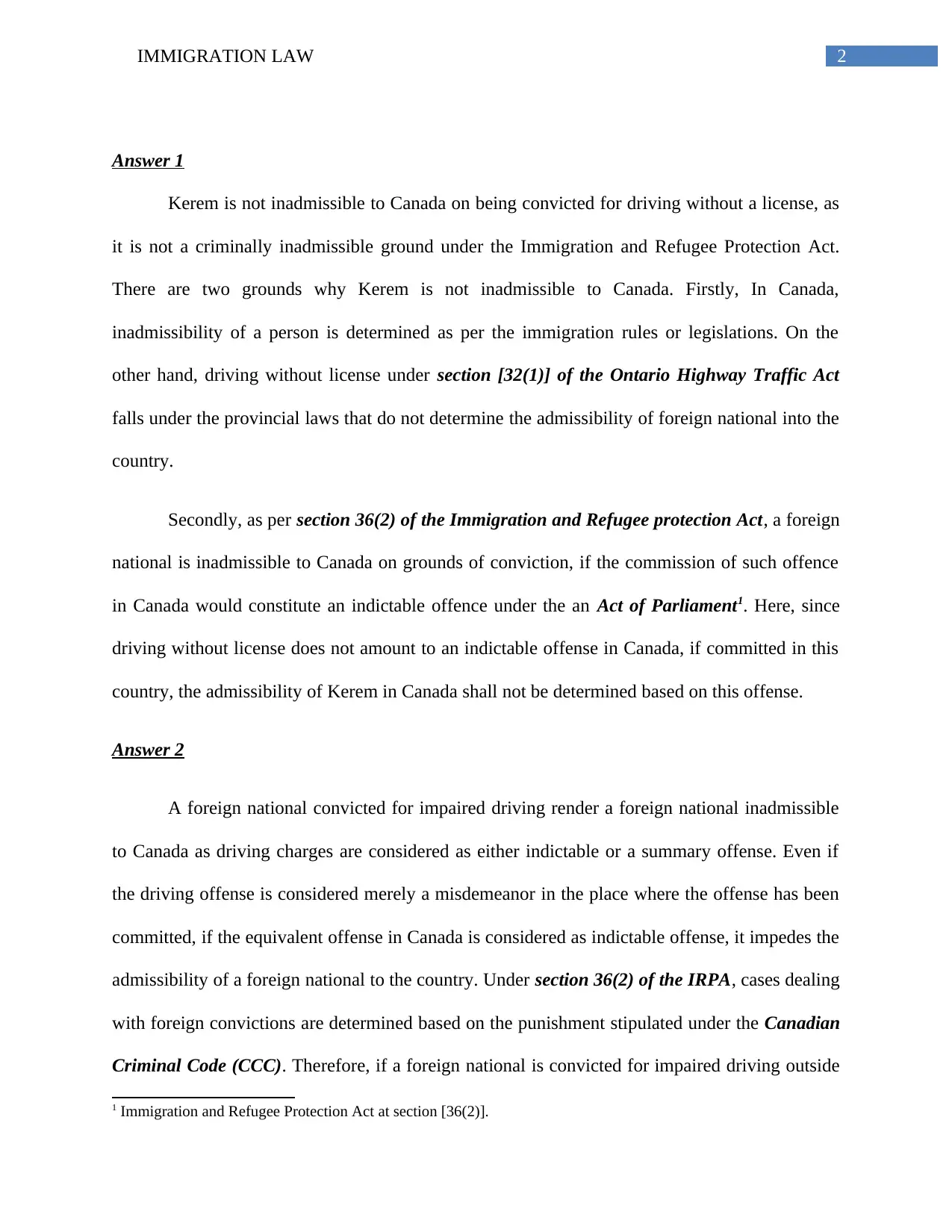
2IMMIGRATION LAW
Answer 1
Kerem is not inadmissible to Canada on being convicted for driving without a license, as
it is not a criminally inadmissible ground under the Immigration and Refugee Protection Act.
There are two grounds why Kerem is not inadmissible to Canada. Firstly, In Canada,
inadmissibility of a person is determined as per the immigration rules or legislations. On the
other hand, driving without license under section [32(1)] of the Ontario Highway Traffic Act
falls under the provincial laws that do not determine the admissibility of foreign national into the
country.
Secondly, as per section 36(2) of the Immigration and Refugee protection Act, a foreign
national is inadmissible to Canada on grounds of conviction, if the commission of such offence
in Canada would constitute an indictable offence under the an Act of Parliament1. Here, since
driving without license does not amount to an indictable offense in Canada, if committed in this
country, the admissibility of Kerem in Canada shall not be determined based on this offense.
Answer 2
A foreign national convicted for impaired driving render a foreign national inadmissible
to Canada as driving charges are considered as either indictable or a summary offense. Even if
the driving offense is considered merely a misdemeanor in the place where the offense has been
committed, if the equivalent offense in Canada is considered as indictable offense, it impedes the
admissibility of a foreign national to the country. Under section 36(2) of the IRPA, cases dealing
with foreign convictions are determined based on the punishment stipulated under the Canadian
Criminal Code (CCC). Therefore, if a foreign national is convicted for impaired driving outside
1 Immigration and Refugee Protection Act at section [36(2)].
Answer 1
Kerem is not inadmissible to Canada on being convicted for driving without a license, as
it is not a criminally inadmissible ground under the Immigration and Refugee Protection Act.
There are two grounds why Kerem is not inadmissible to Canada. Firstly, In Canada,
inadmissibility of a person is determined as per the immigration rules or legislations. On the
other hand, driving without license under section [32(1)] of the Ontario Highway Traffic Act
falls under the provincial laws that do not determine the admissibility of foreign national into the
country.
Secondly, as per section 36(2) of the Immigration and Refugee protection Act, a foreign
national is inadmissible to Canada on grounds of conviction, if the commission of such offence
in Canada would constitute an indictable offence under the an Act of Parliament1. Here, since
driving without license does not amount to an indictable offense in Canada, if committed in this
country, the admissibility of Kerem in Canada shall not be determined based on this offense.
Answer 2
A foreign national convicted for impaired driving render a foreign national inadmissible
to Canada as driving charges are considered as either indictable or a summary offense. Even if
the driving offense is considered merely a misdemeanor in the place where the offense has been
committed, if the equivalent offense in Canada is considered as indictable offense, it impedes the
admissibility of a foreign national to the country. Under section 36(2) of the IRPA, cases dealing
with foreign convictions are determined based on the punishment stipulated under the Canadian
Criminal Code (CCC). Therefore, if a foreign national is convicted for impaired driving outside
1 Immigration and Refugee Protection Act at section [36(2)].
⊘ This is a preview!⊘
Do you want full access?
Subscribe today to unlock all pages.

Trusted by 1+ million students worldwide
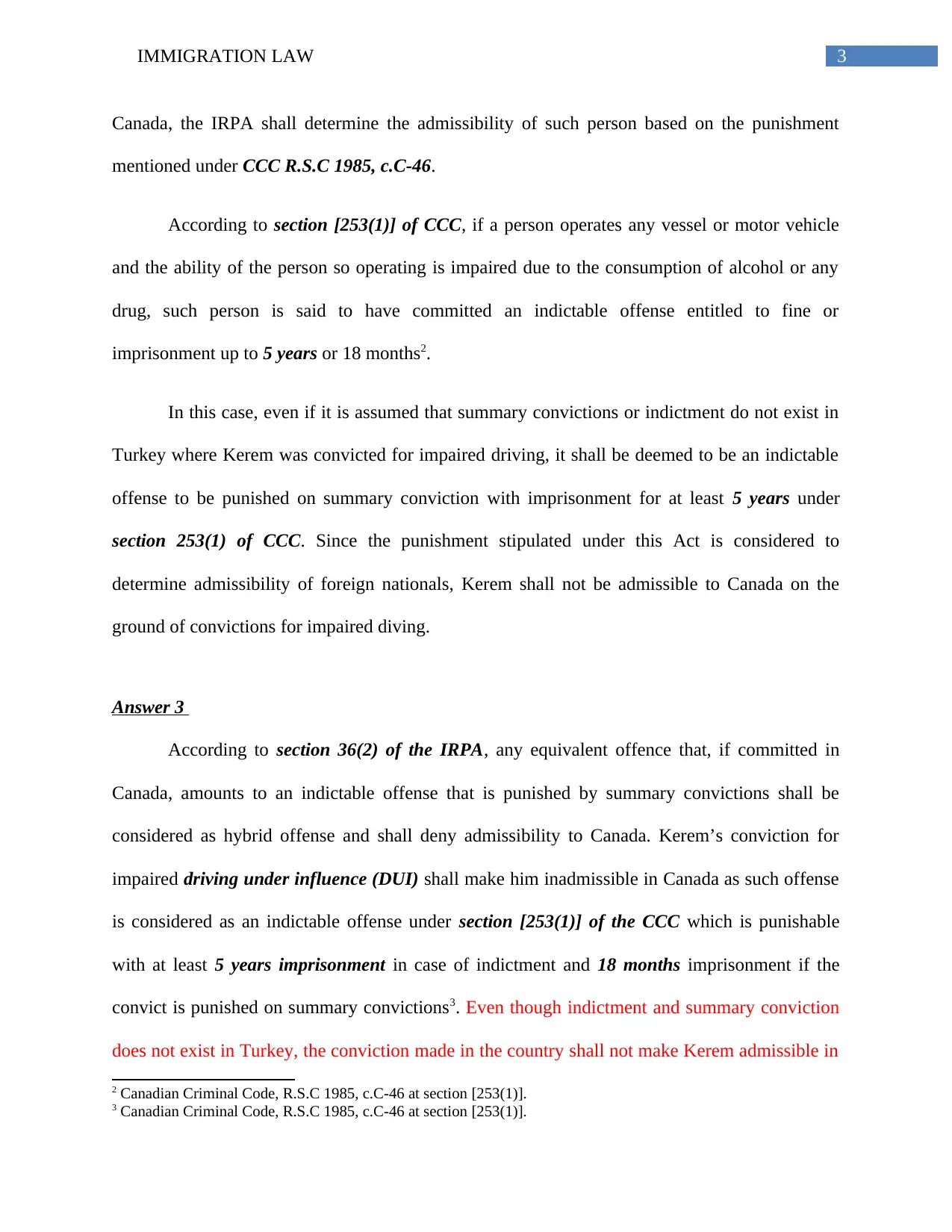
3IMMIGRATION LAW
Canada, the IRPA shall determine the admissibility of such person based on the punishment
mentioned under CCC R.S.C 1985, c.C-46.
According to section [253(1)] of CCC, if a person operates any vessel or motor vehicle
and the ability of the person so operating is impaired due to the consumption of alcohol or any
drug, such person is said to have committed an indictable offense entitled to fine or
imprisonment up to 5 years or 18 months2.
In this case, even if it is assumed that summary convictions or indictment do not exist in
Turkey where Kerem was convicted for impaired driving, it shall be deemed to be an indictable
offense to be punished on summary conviction with imprisonment for at least 5 years under
section 253(1) of CCC. Since the punishment stipulated under this Act is considered to
determine admissibility of foreign nationals, Kerem shall not be admissible to Canada on the
ground of convictions for impaired diving.
Answer 3
According to section 36(2) of the IRPA, any equivalent offence that, if committed in
Canada, amounts to an indictable offense that is punished by summary convictions shall be
considered as hybrid offense and shall deny admissibility to Canada. Kerem’s conviction for
impaired driving under influence (DUI) shall make him inadmissible in Canada as such offense
is considered as an indictable offense under section [253(1)] of the CCC which is punishable
with at least 5 years imprisonment in case of indictment and 18 months imprisonment if the
convict is punished on summary convictions3. Even though indictment and summary conviction
does not exist in Turkey, the conviction made in the country shall not make Kerem admissible in
2 Canadian Criminal Code, R.S.C 1985, c.C-46 at section [253(1)].
3 Canadian Criminal Code, R.S.C 1985, c.C-46 at section [253(1)].
Canada, the IRPA shall determine the admissibility of such person based on the punishment
mentioned under CCC R.S.C 1985, c.C-46.
According to section [253(1)] of CCC, if a person operates any vessel or motor vehicle
and the ability of the person so operating is impaired due to the consumption of alcohol or any
drug, such person is said to have committed an indictable offense entitled to fine or
imprisonment up to 5 years or 18 months2.
In this case, even if it is assumed that summary convictions or indictment do not exist in
Turkey where Kerem was convicted for impaired driving, it shall be deemed to be an indictable
offense to be punished on summary conviction with imprisonment for at least 5 years under
section 253(1) of CCC. Since the punishment stipulated under this Act is considered to
determine admissibility of foreign nationals, Kerem shall not be admissible to Canada on the
ground of convictions for impaired diving.
Answer 3
According to section 36(2) of the IRPA, any equivalent offence that, if committed in
Canada, amounts to an indictable offense that is punished by summary convictions shall be
considered as hybrid offense and shall deny admissibility to Canada. Kerem’s conviction for
impaired driving under influence (DUI) shall make him inadmissible in Canada as such offense
is considered as an indictable offense under section [253(1)] of the CCC which is punishable
with at least 5 years imprisonment in case of indictment and 18 months imprisonment if the
convict is punished on summary convictions3. Even though indictment and summary conviction
does not exist in Turkey, the conviction made in the country shall not make Kerem admissible in
2 Canadian Criminal Code, R.S.C 1985, c.C-46 at section [253(1)].
3 Canadian Criminal Code, R.S.C 1985, c.C-46 at section [253(1)].
Paraphrase This Document
Need a fresh take? Get an instant paraphrase of this document with our AI Paraphraser
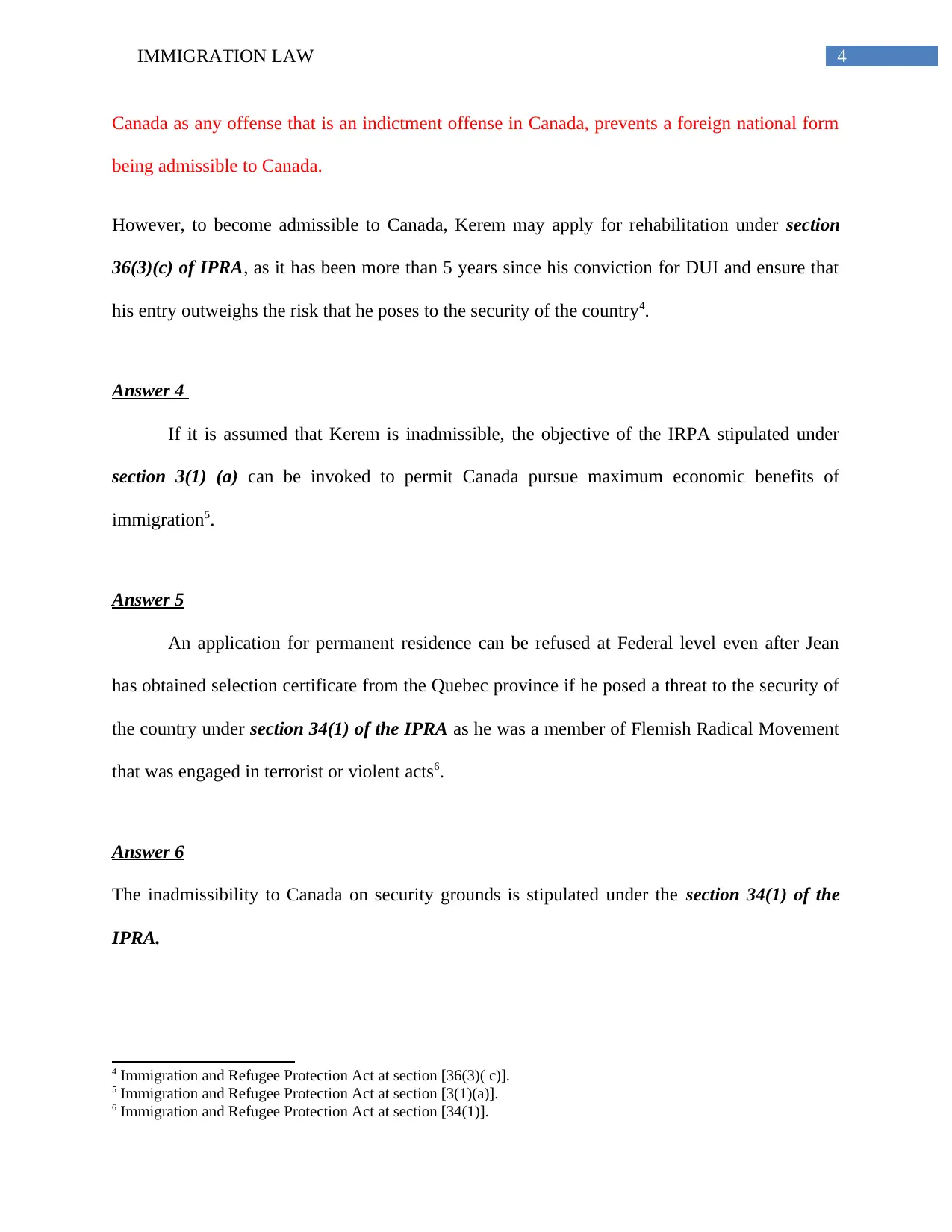
4IMMIGRATION LAW
Canada as any offense that is an indictment offense in Canada, prevents a foreign national form
being admissible to Canada.
However, to become admissible to Canada, Kerem may apply for rehabilitation under section
36(3)(c) of IPRA, as it has been more than 5 years since his conviction for DUI and ensure that
his entry outweighs the risk that he poses to the security of the country4.
Answer 4
If it is assumed that Kerem is inadmissible, the objective of the IRPA stipulated under
section 3(1) (a) can be invoked to permit Canada pursue maximum economic benefits of
immigration5.
Answer 5
An application for permanent residence can be refused at Federal level even after Jean
has obtained selection certificate from the Quebec province if he posed a threat to the security of
the country under section 34(1) of the IPRA as he was a member of Flemish Radical Movement
that was engaged in terrorist or violent acts6.
Answer 6
The inadmissibility to Canada on security grounds is stipulated under the section 34(1) of the
IPRA.
4 Immigration and Refugee Protection Act at section [36(3)( c)].
5 Immigration and Refugee Protection Act at section [3(1)(a)].
6 Immigration and Refugee Protection Act at section [34(1)].
Canada as any offense that is an indictment offense in Canada, prevents a foreign national form
being admissible to Canada.
However, to become admissible to Canada, Kerem may apply for rehabilitation under section
36(3)(c) of IPRA, as it has been more than 5 years since his conviction for DUI and ensure that
his entry outweighs the risk that he poses to the security of the country4.
Answer 4
If it is assumed that Kerem is inadmissible, the objective of the IRPA stipulated under
section 3(1) (a) can be invoked to permit Canada pursue maximum economic benefits of
immigration5.
Answer 5
An application for permanent residence can be refused at Federal level even after Jean
has obtained selection certificate from the Quebec province if he posed a threat to the security of
the country under section 34(1) of the IPRA as he was a member of Flemish Radical Movement
that was engaged in terrorist or violent acts6.
Answer 6
The inadmissibility to Canada on security grounds is stipulated under the section 34(1) of the
IPRA.
4 Immigration and Refugee Protection Act at section [36(3)( c)].
5 Immigration and Refugee Protection Act at section [3(1)(a)].
6 Immigration and Refugee Protection Act at section [34(1)].
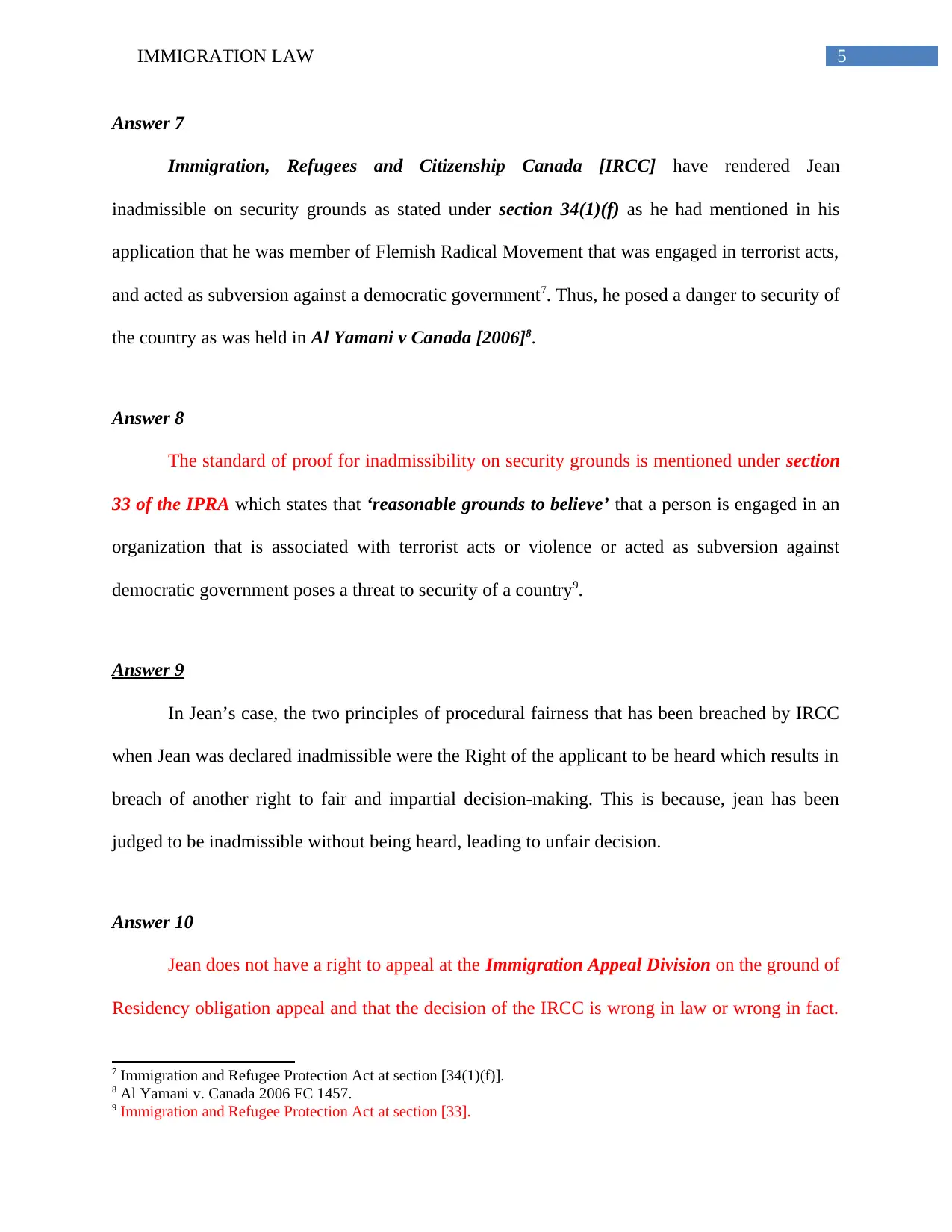
5IMMIGRATION LAW
Answer 7
Immigration, Refugees and Citizenship Canada [IRCC] have rendered Jean
inadmissible on security grounds as stated under section 34(1)(f) as he had mentioned in his
application that he was member of Flemish Radical Movement that was engaged in terrorist acts,
and acted as subversion against a democratic government7. Thus, he posed a danger to security of
the country as was held in Al Yamani v Canada [2006]8.
Answer 8
The standard of proof for inadmissibility on security grounds is mentioned under section
33 of the IPRA which states that ‘reasonable grounds to believe’ that a person is engaged in an
organization that is associated with terrorist acts or violence or acted as subversion against
democratic government poses a threat to security of a country9.
Answer 9
In Jean’s case, the two principles of procedural fairness that has been breached by IRCC
when Jean was declared inadmissible were the Right of the applicant to be heard which results in
breach of another right to fair and impartial decision-making. This is because, jean has been
judged to be inadmissible without being heard, leading to unfair decision.
Answer 10
Jean does not have a right to appeal at the Immigration Appeal Division on the ground of
Residency obligation appeal and that the decision of the IRCC is wrong in law or wrong in fact.
7 Immigration and Refugee Protection Act at section [34(1)(f)].
8 Al Yamani v. Canada 2006 FC 1457.
9 Immigration and Refugee Protection Act at section [33].
Answer 7
Immigration, Refugees and Citizenship Canada [IRCC] have rendered Jean
inadmissible on security grounds as stated under section 34(1)(f) as he had mentioned in his
application that he was member of Flemish Radical Movement that was engaged in terrorist acts,
and acted as subversion against a democratic government7. Thus, he posed a danger to security of
the country as was held in Al Yamani v Canada [2006]8.
Answer 8
The standard of proof for inadmissibility on security grounds is mentioned under section
33 of the IPRA which states that ‘reasonable grounds to believe’ that a person is engaged in an
organization that is associated with terrorist acts or violence or acted as subversion against
democratic government poses a threat to security of a country9.
Answer 9
In Jean’s case, the two principles of procedural fairness that has been breached by IRCC
when Jean was declared inadmissible were the Right of the applicant to be heard which results in
breach of another right to fair and impartial decision-making. This is because, jean has been
judged to be inadmissible without being heard, leading to unfair decision.
Answer 10
Jean does not have a right to appeal at the Immigration Appeal Division on the ground of
Residency obligation appeal and that the decision of the IRCC is wrong in law or wrong in fact.
7 Immigration and Refugee Protection Act at section [34(1)(f)].
8 Al Yamani v. Canada 2006 FC 1457.
9 Immigration and Refugee Protection Act at section [33].
⊘ This is a preview!⊘
Do you want full access?
Subscribe today to unlock all pages.

Trusted by 1+ million students worldwide
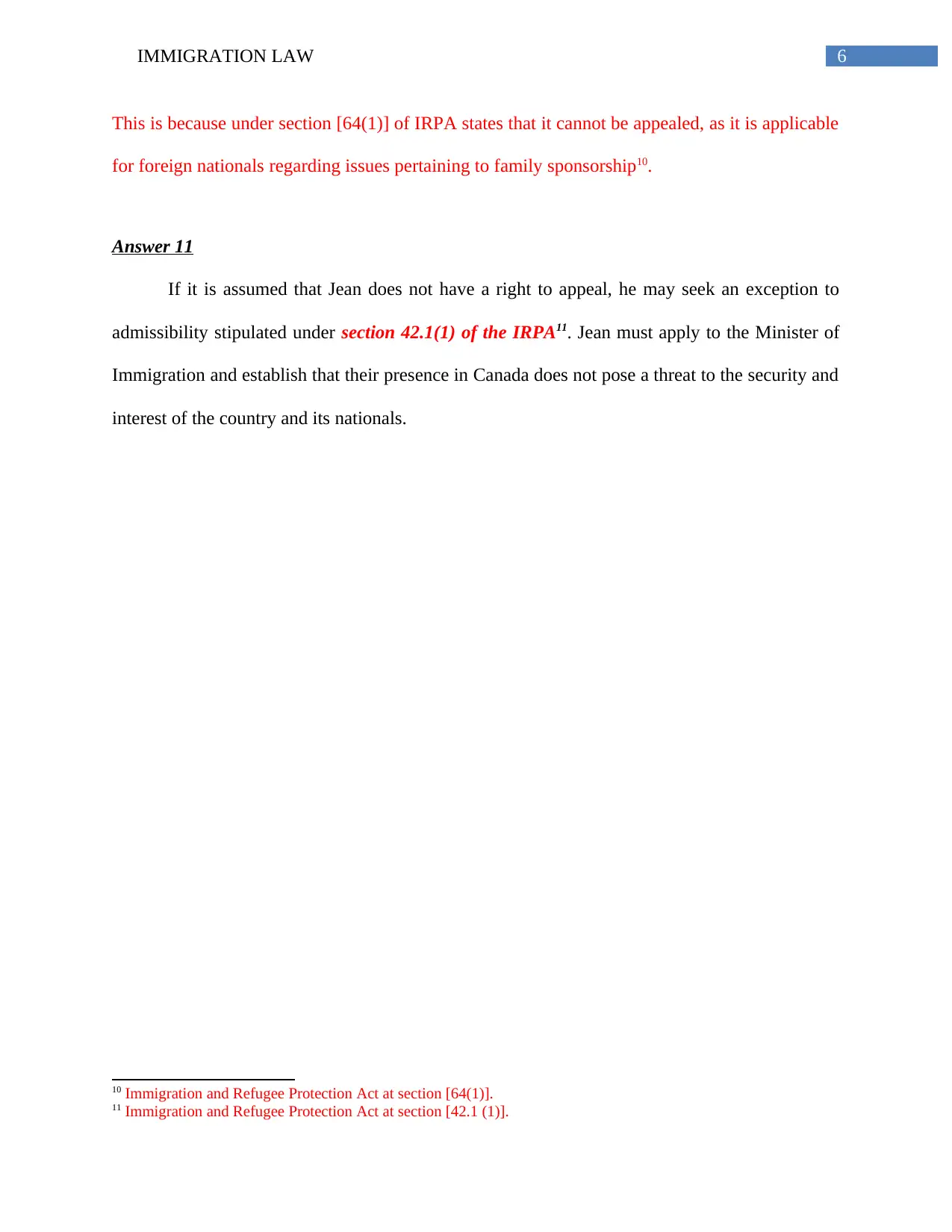
6IMMIGRATION LAW
This is because under section [64(1)] of IRPA states that it cannot be appealed, as it is applicable
for foreign nationals regarding issues pertaining to family sponsorship10.
Answer 11
If it is assumed that Jean does not have a right to appeal, he may seek an exception to
admissibility stipulated under section 42.1(1) of the IRPA11. Jean must apply to the Minister of
Immigration and establish that their presence in Canada does not pose a threat to the security and
interest of the country and its nationals.
10 Immigration and Refugee Protection Act at section [64(1)].
11 Immigration and Refugee Protection Act at section [42.1 (1)].
This is because under section [64(1)] of IRPA states that it cannot be appealed, as it is applicable
for foreign nationals regarding issues pertaining to family sponsorship10.
Answer 11
If it is assumed that Jean does not have a right to appeal, he may seek an exception to
admissibility stipulated under section 42.1(1) of the IRPA11. Jean must apply to the Minister of
Immigration and establish that their presence in Canada does not pose a threat to the security and
interest of the country and its nationals.
10 Immigration and Refugee Protection Act at section [64(1)].
11 Immigration and Refugee Protection Act at section [42.1 (1)].
Paraphrase This Document
Need a fresh take? Get an instant paraphrase of this document with our AI Paraphraser
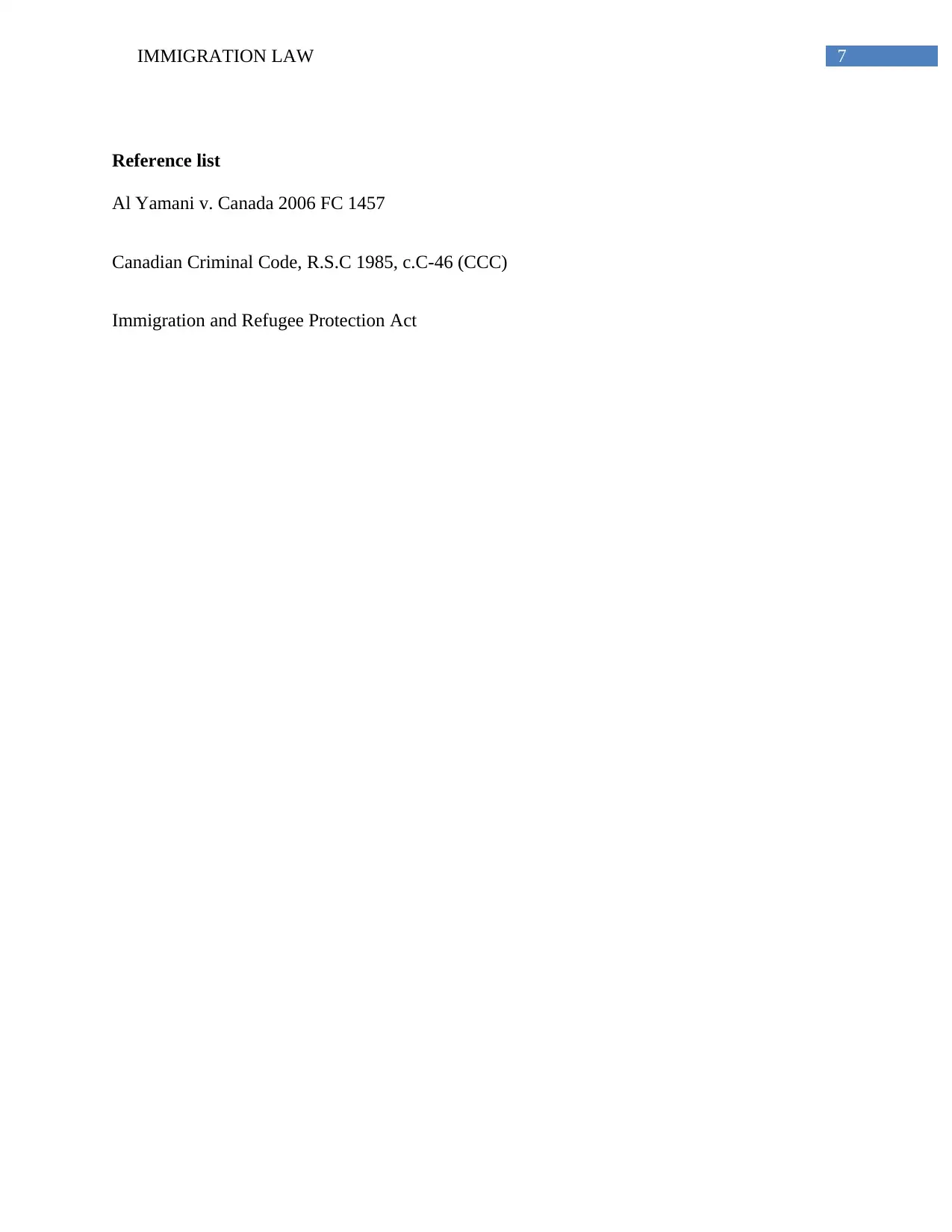
7IMMIGRATION LAW
Reference list
Al Yamani v. Canada 2006 FC 1457
Canadian Criminal Code, R.S.C 1985, c.C-46 (CCC)
Immigration and Refugee Protection Act
Reference list
Al Yamani v. Canada 2006 FC 1457
Canadian Criminal Code, R.S.C 1985, c.C-46 (CCC)
Immigration and Refugee Protection Act
1 out of 8
Your All-in-One AI-Powered Toolkit for Academic Success.
+13062052269
info@desklib.com
Available 24*7 on WhatsApp / Email
![[object Object]](/_next/static/media/star-bottom.7253800d.svg)
Unlock your academic potential
Copyright © 2020–2026 A2Z Services. All Rights Reserved. Developed and managed by ZUCOL.